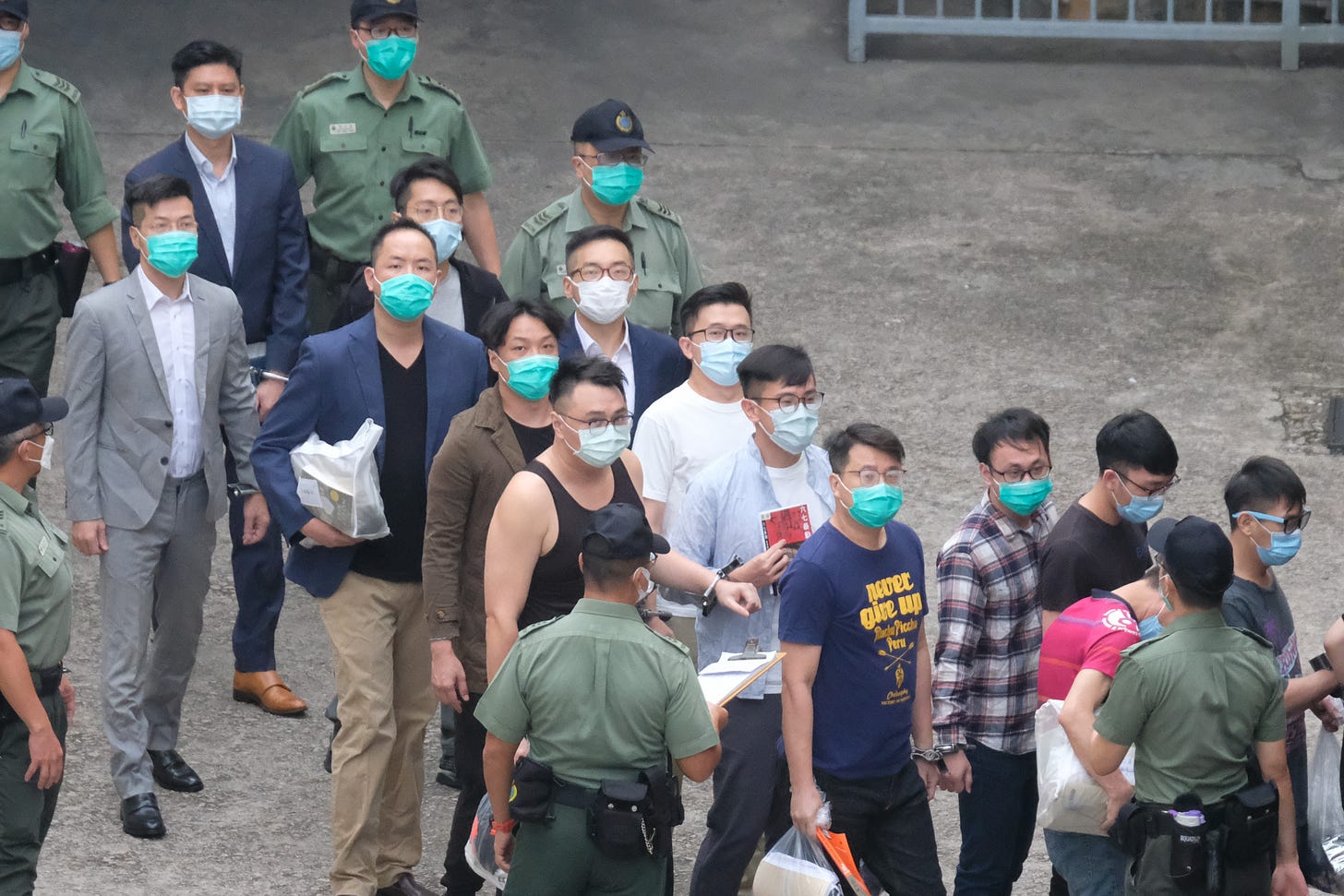Jailed for Four Years for Exercising Basic Rights—Now Their Future Is Uncertain
For the Hong Kong democracy campaigners standing against Beijing, beyond the prison gates, freedom remains elusive.
I left Hong Kong in 2020, anticipating a far more severe political crackdown than what had already unfolded. As it turns out, luck was on my side. Not long after my departure—and after the imposition of the National Security Law (NSL)—the Hong Kong government began hinting that I was a wanted fugitive after I testified before the U.S. Congress. I knew that I was not going home anytime soon.
Friends in Hong Kong are far less fortunate. The idea of national security has been weaponized by the Hong Kong government to silence dissent in the past few years. The most glaring example of this came with the infamous Hong Kong 47 case. They were accused of “conspiracy to subvert state power” for organizing a grassroots primary election—something any competent political party would do in a functioning democracy. The “rationale” was that these campaigners attempted to paralyze the government by securing a legislative majority and exercising their right to veto bills.
The absurdity was hard to fathom. No one should face prison for peacefully seeking a public mandate to oppose government policies. And yet, that’s exactly what happened in Hong Kong. In the NSL court—where judges are handpicked by the government to try NSL cases—the outcome was grim but predictable. Nearly all were convicted. Sentences ranged from four years and two months to ten years—for what amounted to a routine exercise in democratic participation.
Now, years later, some of them are beginning to walk free. Among them is veteran journalist and politician Claudia Mo. A beloved figure in Hong Kong, Claudia dedicated her life to preserving the city’s unique cultural identity. Her years in broadcasting, particularly in teaching English, earned her widespread popularity. She came to embody the “East meets West” spirit that once defined Hong Kong—a spirit that grows harder to find with each passing year.
Two years ago, Claudia Mo’s husband was reportedly gravely ill. In response, 54 British Members of Parliament and prominent public figures publicly called for her release or bail so she could visit him. That appeal was ignored.
Another political prisoner, Wu Chi-Wai, endured even worse personal tragedies behind bars. He lost both of his parents while serving his sentence. The treatment he received from the Correctional Services Department was nothing short of callous. In 2021, his initial request to attend his father’s funeral was denied—only overturned later by the court, which granted him the necessary bail for just one day. When his mother passed away in 2024, he was again permitted to attend the funeral, but only briefly—surrounded by security officers, his time at the service lasted a mere 25 minutes.
The political crackdown in Hong Kong is not just systemic—it is profoundly personal and painful. Most of the imprisoned campaigners devoted their lives to public service. They believed in democratic governance as a mechanism to improve lives and hold power to account. Many are accomplished professionals—lawyers, doctors, civil servants—whose guiding motivation was a deep and abiding love for Hong Kong: the city where they were raised, where they built their careers, and where they once hoped future generations might flourish.
But Beijing had other plans. As the Chinese Communist Party grew increasingly self-assured in its authoritarian model, the need for Hong Kong to serve as a showcase of a possible version of modernization and democratization faded. The collapse of the city’s civil society followed swiftly. The human cost—lives upended, families fractured—remains buried beneath the political rubble.
Now, as some of these campaigners prepare to leave prison, their futures remain uncertain. Nominal release does not guarantee true freedom. Under the National Security Law, the authorities have extended their reach beyond the prison walls. The NSL bureau and police have exercised their power through a climate of intimidation—cutting off imprisoned activists’ communication with the outside world, preventing political figures from leaving the city, and targeting the family and friends of exiled dissidents with raids and interrogations.
We still do not know what awaits these individuals once they step outside the prison gates. Will they be allowed to resume life in peace, even in silence? Or will they remain targets, shadows of their former selves, under constant watch? That, too, is part of the tragedy.
(Photo: inmediahk)




Sincerely, I’d like to know: where do you find your courage? As you are likely well aware, we in the United States are battling a fascist, autocratic takeover. I am horrified and mourning the loss of what we once believed to be true - that our constitutional republic with democratic values - is infallible. It’s gone. Or at minimum, gasping its last, as our judicial branch is engaged in fierce battle with the executive. Without legislative branch assisting, they will fall. I am doing all that I can - from the comfort of my home - to fight. My husband doesn’t want me to attend protests, so I am selective about those I attend (not in large cities, not those likely to draw violent dissidents). We have an 18 year old son. My fear isn’t for myself, it’s for what consequences my actions may have for him. I don’t know how to fight around that fear.